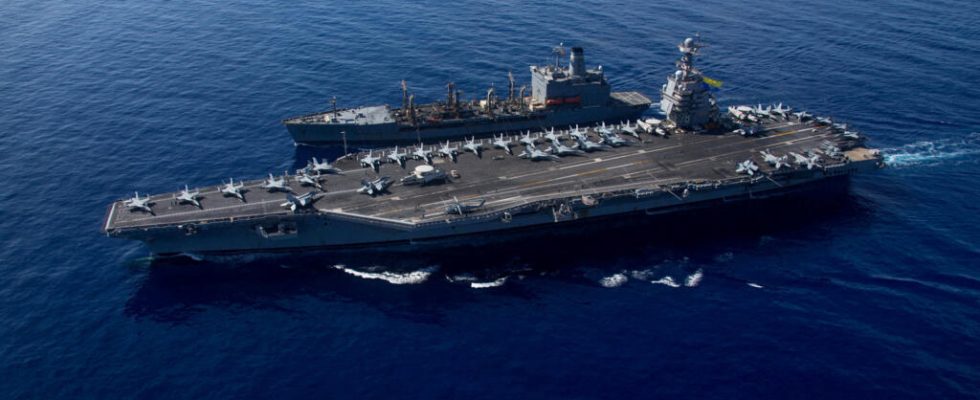The Australian press group ABC News announced it, the American navy confirmed it Monday, January 1 at the end of the day: the nuclear aircraft carrier USS Gerald Ford will leave the Middle East in the coming days. The United States had deployed the aircraft carrier in the Eastern Mediterranean after the bloody attack carried out by Hamas in Israel on October 7.
3 mins
L’USS Gerald Ford, its eight fighter squadrons and 4,000 crew members are expected to leave the eastern Mediterranean in the coming days. Information given by two senior American officials at ABC News. The US Department of Defense has confirmed: the aircraft carrier will return to the United States “ in the coming days “.
Sent for “ contribute to our regional deterrence and defense positioning “, the USS Gerald R. Ford ” will redeploy to its original port as planned to prepare for future deployments “, the Navy said in a statement. “ The Department of Defense constantly evaluates force positioning around the world and will maintain important capabilities both in the Mediterranean and across the Middle East “, she added. New generation aircraft carrier, theUSS Gerald Ford is a 100,000-ton nuclear-powered ship equipped with new technologies.
In Israel, a major general speaks of a withdrawal “ a little worrying “.
In early October, America’s newest and largest aircraft carrier was completing its first operational deployment when Washington redirected it to the region. Objective: to show support for Israel in the aftermath of the Hamas attack, and to dissuade Iran and Hezbollah from expanding the conflict on a regional scale.
Two weeks ago, the Secretary of State for Defense extended the aircraft carrier’s deployment beyond the holidays for the third time, an announcement that was hard felt by the crew according to the ship’s commander.
Despite this departure, says one of the senior officials interviewed by ABC News, “ the United States still has a very large military capacity in the region, and great flexibility » to add more warships – two more arrived in the region last week.
A second nuclear aircraft carrier still remains near Yemen to prevent attacks carried out by Houthi rebels, in a sign of support for Hamas, against commercial ships.
Why this withdrawal?
Contacted by RFI, Karim Bitar, professor of international relations at Saint-Joseph University in Beirut, believes “ that just one of these aircraft carriers is more than enough to achieve this objective, to strike Iran in the event that there is a desire to attack Israel. And today, moreover, we cannot exclude the fact that this withdrawal of [l’USS Gerald Ford] is also a message to send to Israel because, today, it seems clear that neither Hezbollah nor Iran has any real desire or interest in seeing an expansion of the scope of the conflict. »
“ On the other hand, we are hearing more and more declarations from Israeli ministers who wish to go to the end and use this American umbrella to possibly settle scores with Tehran’s other regional allies. », he adds. “ So, we cannot exclude that this is perhaps also a call for restraint sent to Israel, while keeping in mind that very quickly the United States could once again strengthen its presence in the Mediterranean if Israel was truly threatened. »
Karim Bitar also points out that in the United States, in the middle of an election year, many voices are being raised and believe that the country has gone too far in its unconditional support for Israel. Hence this shift in American policy in the conflict.
Read alsoIsrael-Hamas war: Biden’s popularity with Muslim voters in freefall
The United States, in an election year, realizes that many voices are being raised, not only among its allies in the Arab world, but also among the new generation of Americans, notably those who support the Democratic Party of Joe Biden, and who find that America has gone too far in its carte blanche given to Israel. This is why I think that it is not excluded that this is indirectly a signal sent to Israel that it is time to show restraint and that we should especially not take the presence in the Mediterranean of this American umbrella to broaden the scope of the conflict and want to plunge into a headlong rush and attack Lebanon and possibly other regional partners of Iran.
Karim Bitar, professor of international relations at Saint-Joseph University in Beirut
Read also[EN DIRECT] Israel-Hamas war: conflict will continue “throughout” 2024, according to Israeli army
